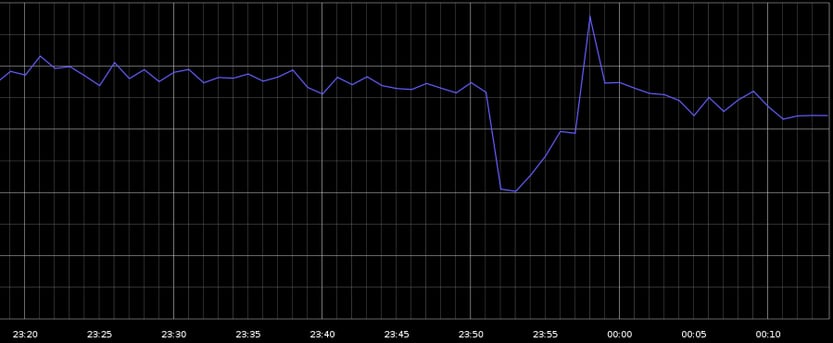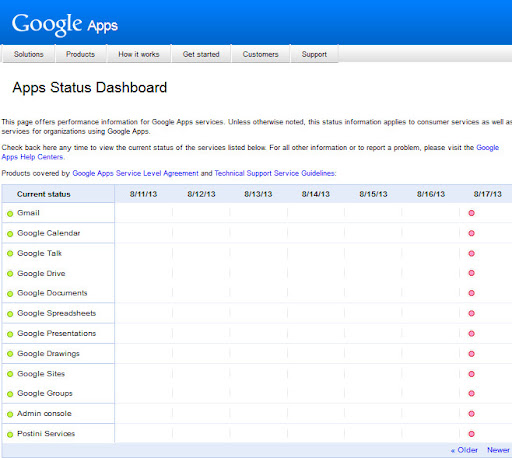By Miva | August 19, 2013

See why top ecommerce brands use Miva’s no-code platform to run
multiple stores, manage massive catalogs, and grow their revenue.
In case you missed it, Google had a five-minute outage this past Friday across all of its services. It has been three days since the outage, and Google is still staying quiet, which is leading to speculation about the actual cause.The vast majority of Internet users rely on Google to get them where they want to go on the World Wide Web every day. Digital experts and users alike were shocked that a powerhouse such as Google would incur such an impactful outage such as this one.
If five minutes does not seem like a substantial amount of time to you, take a look at these shocking stats:

This graph provided by GoSquared.com shows a 40% drop in Internet traffic during the Google outage. Note the page views spike shortly afterwards, as the search engine starting working again.
Any attempts to contact Google have been replied to with the Google Apps Dashboard, which very minimally acknowledge the outage on each of their services.
The dashboard message said: “We’re aware of a problem with Gmail affecting a significant subset of users. The affected users are able to access Gmail, but are seeing error messages and/or other unexpected behavior.”
A later message added: “Between 15:51 and 15:52 PDT, 50% to 70% of requests to Google received errors; service was mostly restored one minute later, and entirely restored after four minutes.”

The red dots on the dashboard indicate that the outage occurred on every one of Google’s major services.
There are widespread reactions, from experts to Google users, and everyone has their own theory in the wake of the search engine’s eclipse:
Many digital experts say that the outage is completely unprecedented:
“It’s a massive surprise for all of Google’s services to go down at the same time. It’s probably a physical infrastructure problem given the size of the outage, but it’s hard to know at this stage. This is completely unprecedented. I’ve never heard of anything like this before. One or two of Google’s services have gone down in the past, like Gmail and Google Apps, but they both happened separately,” said Digital expert Phil Dearson, head of strategy for Tribal Worldwide.
Global Internet traffic fell by around 40% during the black-out. “That’s huge,” said GoSquared developer Simon Tabor. “As internet users, our reliance on Google.com being up is huge.’ [It really reflects Google’s massive grip on the web.]”
Others believe that the outage really doesn’t have any impact on users or storeowners at all:
“I’d say the overall impact was modest since the outage mainly seemed to impact lower bandwidth (but arguably more critical) services like gmail,” said Craig Labovitz, founder of Deepfield and added, “Specifically, the large volumes of Youtube traffic originating from distributed Google Edge Caches (GGC) do not appear to have been impacted in the same way.”
“This money [lost] is very small compared with the $40bn annual revenue that Google generates,” said technology news website TechNewsPlus. “It is also estimated that the subsequent spike in traffic might have adjusted even this loss.”
Greg Sterling, a researcher with Sterling Market Intelligence said,“This individual outage doesn’t matter. The idea that Google could go down is unsettling to people but it doesn’t create a problem for the company unless it starts to happen more frequently.”
Some commenters on the incident are using the outage to poke fun at the world’s reliance on the search engine platform:
Joseph Bloughs, Google user, commented on the outage: “It’s as if the equivalent of this happened, except on the internet:
“I’m not surprised Google drops off the planet for 5 minutes – I’m surprised it doesn’t happen more often, and I’m astonished they get it back online in 5 minutes. I also feel sorry for people setting up their Internet connection at home in that outage window, when they tried connecting to https://www.google.com to verify their connection and it failed. I ‘can’t reach Google – my Internet must be bust, it certainly can’t be Google that’s unavailable,’” said another user.
Some suggested that the outage could be due to a single point of failure that was exposed to a hacker or an internal mistake. Either way, Google would not want to publicize the error, which could be why they are keeping quiet. If it were an internal error, they may be keeping quiet in order to keep up their reputation.
“Unfortunately beyond the information on our Apps Status Board we have nothing further to comment,” a Google spokesman said.
Right on the heels of Google’s outage, Amazon.com went down today and will likely cost the ecommerce giant million in lost sales.
The recent events of outages are a great reminder for ecommerce merchants of the importance of a quality ecommerce platform to avoid outages and the lost sales that ensue. Speed, reliability and security are things most ecommerce merchants often take for granted or assume in a platform, but they absolutely should not. To learn more about what you should look for in an ecommerce platform, read more here.
Back to topNo worries, download the PDF version now and enjoy your reading later...
Download PDF Miva
Miva
Miva offers a flexible and adaptable ecommerce platform that evolves with businesses and allows them to drive sales, maximize average order value, cut overhead costs, and increase revenue. Miva has been helping businesses realize their ecommerce potential for over 20 years and empowering retail, wholesale, and direct-to-consumer sellers across all industries to transform their business through ecommerce.
Visit Website